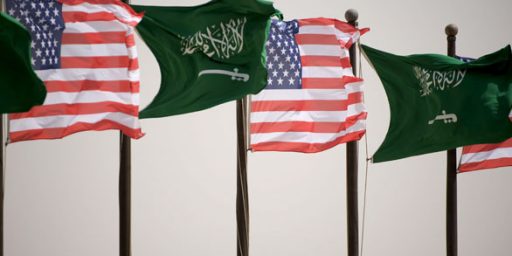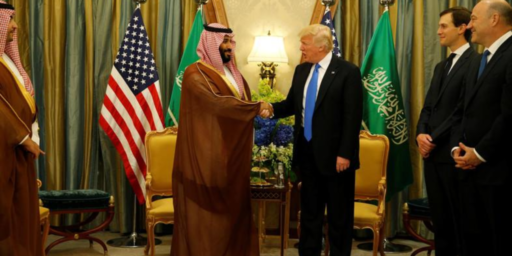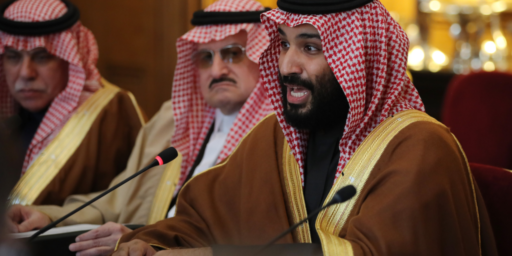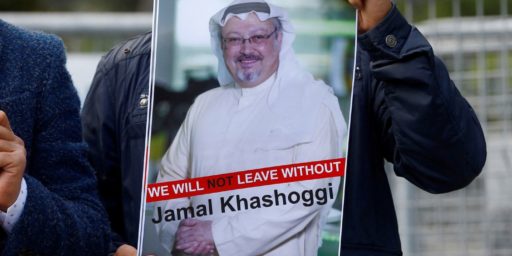ABC TV Looks at Saudi Arabia
This past week, ABC TV’s Diane Sawyer has been reporting on her travels to Afghanistan and Saudi Arabia for the ‘Good Morning America’ program. There’s not a lot there for anyone with any foreign policy savvy, but a few things did pop out. Below is a brief overview of the different segments that aired and are available for your viewing pleasure on the ABC website through the links.
The most interesting segment was a 7-minute interview with Saudi Foreign Minister Pr. Saud Al-Faisal (additional bits of the interview are interspersed in the other segments). Among issues addressed is King Abdullah’s calling the US presence in Iraq ‘illegitimate foreign occupation’: Al-Faisal says it’s a matter of ‘legitimacy’ rather than ‘legality’. The Saudis did not ‘dis’ the White House by not accepting an invitation: the timing was wrong and no other meaning should be inferred. Al-Faisal tries to distinguish between text books and religious primers when it comes to attitudes about other religions. Saudi schools, he says, are trying to promote tolerance and openness, but books that are instructing on religious doctrine are always intolerant, no matter the religion involved. The interview is worth watching. There’s supposed to be another interview coming soon about women in Saudi Arabia.
‘Saudi Schools’ takes a look at a pre-school and what’s being taught there. When it comes to investigation into Saudi schools, the piece is pretty shallow. Talking with a group of five-year-olds, Sawyer finds that they have already developed negative opinions of Christians (“Christians don’t pray, but Muslims do pray”). The kids are also attuned to the TV, with one citing ‘Dr. Phil’ as one of the programs he watches. What’s pretty amazing, though, is these children’s facility with English. I have to assume that they are the children of mothers for whom English is the mother tongue and English is the children’s first language. In other words, these children are not very representative of Saudi children at all.
‘The Middle East’s Wealth Gap’ isn’t all that informative, either. It’s basically saying ‘There are some super-wealthy Arabs, but also poor Arabs.’ Parts of this clip deal with Saudi Arabia, including panoramic views of the Defense Minister’s cruise-ship-sized yacht. Most of the clip deals with the UAE, though, and the incredible real estate developments going on. Not much exploration of the plight of the poor, though, outside of Afghanistan. Sawyer cites statistics that the average Saudi income is around $14,000/year while that of Abu Dhabi, with only 120,000 citizens, has a per capita income of $70 million (at least on paper). She asks Pr. Saud about why the USG is spending $3 billion in Afghanistan while Saudi Arabia spends only $200 million. Saud answers that Saudi Arabia doesn’t have an army there to protect its aid programs. (He might also have added that when Saudi Arabia was slow to stop its aid to the Afghan government that morphed into the Taliban, it got severely whacked by the US opinion and policy writers.)
‘Sex and Islam’ is a bit of a mash-up. It briefly mentions that Saudis are using technology to break through social barriers to meet members of the opposite sex and that Saudi women live strictly delimited lives. Sawyer gets Pr. Saud to say that controls on relations between the sexes is not a matter of Islam but rather of tradition and culture and these take a long time to change. He asks Sawyer how long it took for for women to get the right to vote in the US. Sawyer doesn’t provide an answer. The largest segment of this piece is with an Egyptian ‘Dr. Ruth’, Dr. Heba Kotb, who offers advice about sex on her TV program, basing her response on what’s found in the Quran. Why this runs under a banner of ‘Assignment Saudi Arabia’, though, is a puzzle.
Today’s installment of Diane Sawyer’s visit to Saudi Arabia is pretty lame. She focuses on camels, guaranteed to perpetuate the stereotype of Saudi Arabia as not much beyond camels and oil. In fact, Saudis are only slightly more likely to have ridden a camel in their lives than an average American. Camels are part of Saudi history and tradition, but Saudis travel more in Toyotas and Fords, or Airbuses and Boeings than they do on the ‘ship of the desert’. Along Jeddah’s Corniche you’ll find men offering camel rides (as well as donkey and horse rides) to the tourists and that’s where many Saudis will have their first and only experience with camels. Well, camel meat is available in most supermarkets, but that’s a slightly different thing. But it’s a normal a facet of life and the newspapers report on distribution problems leading to tainted camel meat… just like the current problem with pet food in the US.
The series isn’t worthless. The visuals do help comprehension but there’s no great depth to the various pieces. Still, having some good information is better than continued ignorance, even if it tends to confirm stereotypes.






Diane Sawyer is a leading star in “Fluff TV”. I’d rather watch reruns!